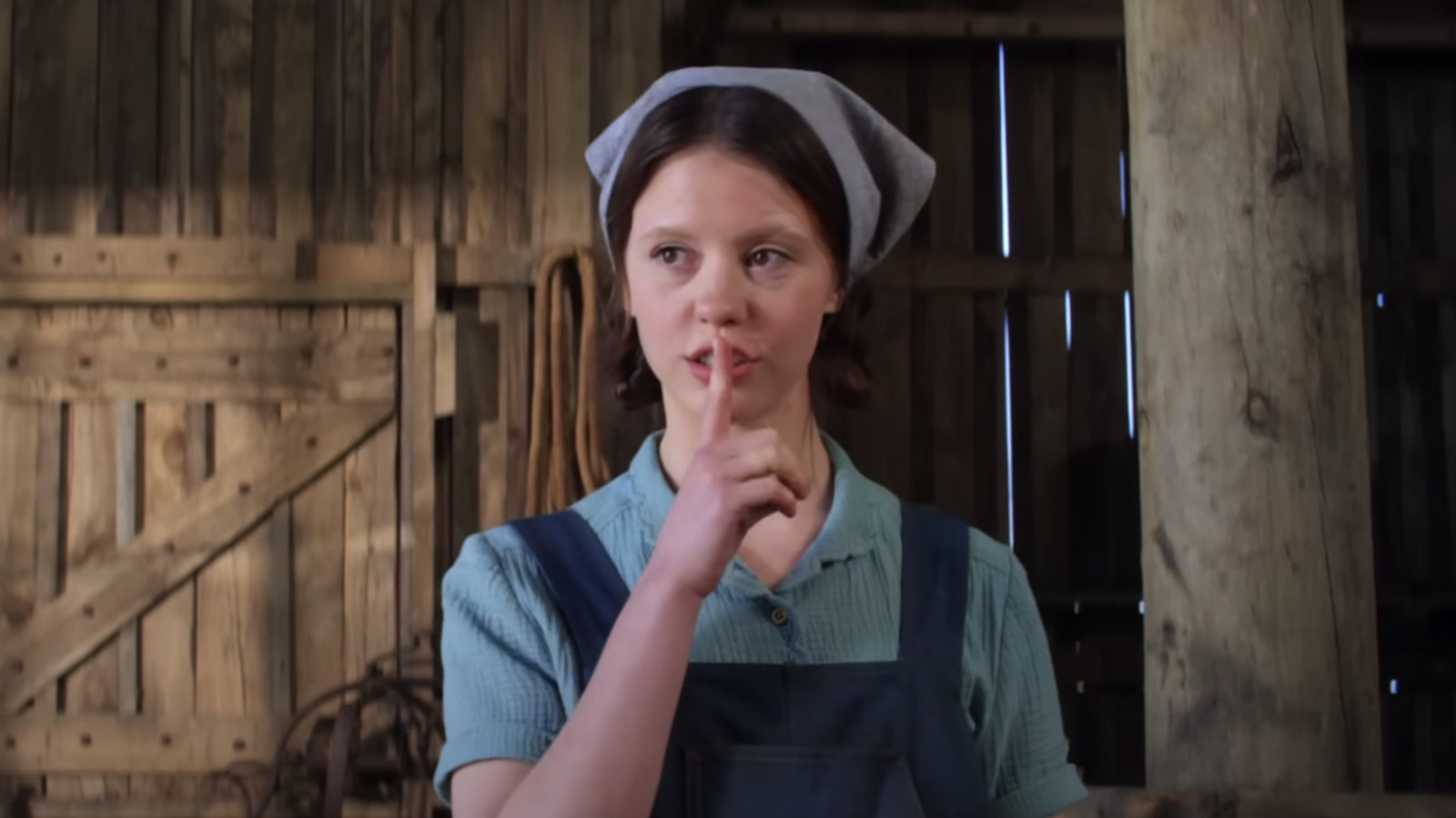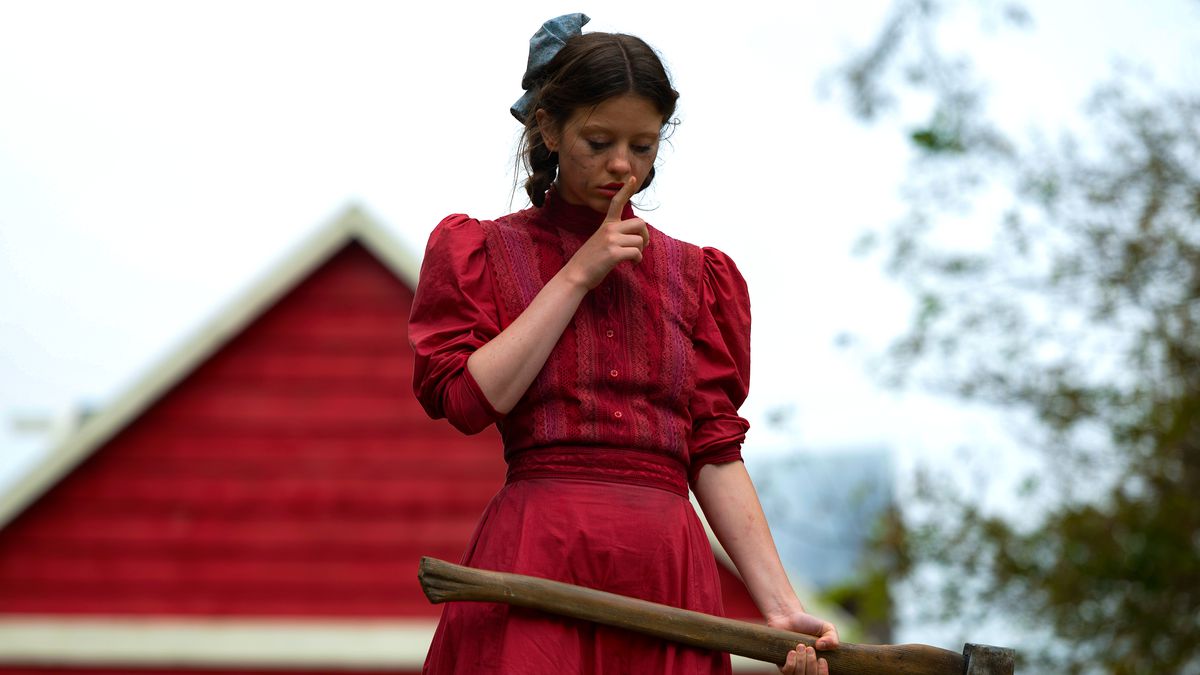It is nearly impossible to review a sequel without considering it in the context of its preceding film. Pearl, Ti West’s follow-up to the 2022 slasher, X (that’s two films in the same series within a year, folks), is a more subversive genre bender than its predecessor and presents the audience with a complex portrait of X’s primary antagonist. The film is rife with the inevitable easter eggs meant to service the fans of the series’ first installation, but recognizing these callbacks proves to be the least interesting part of the sequel experience. Pearl manages to construct its own world of meta references and existential conflicts without relying on the fleeting shock values that made X a uniquely self-aware slasher.
Mia Goth (who has executive producing and co-screenwriting credits) reprises her role as Pearl, a young farmgirl with aspirations for stardom during the boom of Hollywood’s golden age. The film opens with a credit sequence and orchestral score reminiscent of the golden age itself, and throughout its exposition and crucial plot points, deploys the storytelling tropes and performative characteristics of golden age films. Pearl, dreamy-eyed and doe-like a la Dorothy in The Wizard of Oz, describes her delusions of grandeur and her escape from rural isolation on the family farm to the kindly barn animals while she pines for her betrothed, Howard, who is fighting overseas in WWI. Her harsh, austere mother discourages those dreams as not only frivolous, but a total abandonment of her responsibilities to care for her paralyzed father and to help maintain the farm.
Pearl’s isolation is exacerbated by the outbreak of the Spanish flu. The film presents this plot point as a timely parallel to COVID-era social distancing and masking precautions, though it feels more like a failed attempt at relevancy since approximately 95% of the theater in NYC’s east village was unmasked. The Spanish flu detail becomes entirely irrelevant by the second act.

To find respite from the bucolic chores and regain a semblance of social interaction, Pearl steals away to the local movie theater in town where she basks in reels of a dance troupe not unlike an early iteration of the Rockettes. Pearl, similar to X, delves into the transformative power of film, the seemingly endless possibilities of who you can become in front of a camera. It is a love letter to the promises of the movies and the unprecedented language it bestows upon its viewers. Pearl sees her life as inextricable from cinema (echoing the sentiments of Godard, the sly artistic titan, who died earlier this month) and thus cannot fathom remaining in a world devoid of stardom. Pearl is thoroughly convinced that she is divinely suited for something better.
Pearl strikes up a romantic relationship with the theater’s debonaire Projectionist (David Corenswet), from whom she learns about the breadth of cinema in circulation outside her small town (including smut films, which plants the seed of her mistrust of men outside her beloved Howard). Pearl convinces herself that, if nothing else, she and the Projectionist will elope to Europe. This is the first of many broken promises, igniting a string of events, one rejection after another, that sends Pearl into a descent of savage madness and an unflinching killing spree exemplifying the gratuitous violence of any slasher film.
Well, hell hath no fury like a woman scorned. Pearl’s delusions of grandeur—her insistence that she is bound for stardom, based not on her objective talent as a performer (which is displayed during an audition for a local church dance review), but her blind faith in a preferable fate—are matched in severity only by the savage coldness with which she disposes of the people she feels are responsible for anchoring her to her dead-end life on the farm. Of course, she blames everyone except herself, including her elegant, monied sister-in-law (Emma Jenkins-Purro) who nails her own audition for the same review.

After she realizes that her dream of stardom is not as easily achieved as walking into a room and tap dancing, and suffering a dire betrayal at the hands of her sister-in-law, Pearl delivers an impassioned monologue, making explicit her fractured mental state. The emotional exposition of this third act speech seems to indicate that the film does not trust the viewer (at least in this respect; it toys freely with the viewer’s expectations elsewhere) to assess Pearl’s complex psychological state. We are given a verbal dossier on her desires and shortcomings, and the transgressions that she feels have been committed upon the fate she deserves.
Are we to pin the burden on Pearl or on the dream that was sold to her? The film doesn’t condemn moving pictures for inflating its viewer’s expectations. The horror of Pearl is not a deranged octogenarian with a pitchfork and a violent chip on her shoulder hunting a porno film crew; the haunting terror is a world that, for all its wonders and promise, remains indifferent to the glamorous fate its titular character believes she deserves. The crux of Pearl’s distress—which, of course, results in numerous bloody casualties, the film subverting the characteristics of a Hollywood golden age drama with the twisted sadism of a slasher—stems from her conviction that the world owes her the great prize of Hollywood stardom. She believes she’s been promised a release from the isolation of her home life in exchange for celebrity, such is her belief in her unsupported powers of stardom.
And yet, to find sympathy for Pearl’s plight, we must choose to see the film as a sort of quasi-body horror in which Pearl is quite literally betrayed by the body in which she finds herself trapped; she feels in her bones that she deserves to be a star, but is a victim of the unfortunate circumstance to be imprisoned within the boundaries of a young farmgirl in 1918 rural America. This interpretation is much more engaging when we consider Mia Goth’s performance—who in her own right is indelibly carving out her own cult stardom with her range and body of work—as a burgeoning star condemned to a life of pastoral suffering.
But perhaps the most plausible interpretation is simply that Pearl is a young woman who throws a fit when she doesn’t get what she wants. When her delusions of grandeur are popped, it becomes evident that the true horror is worshipping an unobtainable future and realizing that the world immediately before you is your reality, rather than a silver screen dream amongst the stars. Pearl embodies the notion that cinema presents many wondrous promises, but to let its fictions decide your own fate and happiness is to die a thousand deaths.









